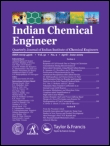
Indian Chemical Engineer
Scope & Guideline
Connecting Research and Practice in Chemical Engineering.
Introduction
Aims and Scopes
- Chemical Process Optimization:
Research emphasizing the optimization of chemical processes through various methodologies, including response surface methodology and computational analysis, aimed at improving efficiency and reducing costs. - Sustainable Practices and Green Chemistry:
Studies focusing on environmentally friendly approaches and sustainable practices in chemical engineering, such as waste valorization, biofuel production, and the use of renewable resources. - Material Science and Nanotechnology:
Investigations into new materials, particularly nanomaterials, and their applications in chemical processes, environmental remediation, and sensor technologies. - Environmental Engineering and Waste Management:
Research addressing the treatment of industrial waste, water purification, and the recovery of valuable materials from waste streams, highlighting the importance of environmental sustainability. - Computational Modeling and Simulation:
Utilization of computational techniques and simulations, including CFD and machine learning, to analyze and optimize chemical processes and systems. - Catalysis and Reaction Engineering:
Exploration of catalytic processes and reaction kinetics, focusing on the development of new catalysts and optimization of existing catalytic systems for various chemical reactions.
Trending and Emerging
- Bioengineering and Bioprocessing:
There is an increasing focus on bioengineering applications, including biofuel production from waste materials and microbial processes, highlighting the importance of biological systems in chemical engineering. - Advanced Material Development:
Emerging research on the development of advanced materials, including nanocomposites and biodegradable materials, demonstrates a growing interest in innovative materials for various applications. - Artificial Intelligence and Machine Learning Applications:
The application of AI and machine learning in chemical engineering for process optimization and predictive modeling is on the rise, indicating a trend towards data-driven research methodologies. - Energy Recovery and Circular Economy Practices:
Research centered on energy recovery from waste and the principles of the circular economy is gaining prominence, showcasing a shift towards sustainable practices in chemical engineering. - Process Safety and Risk Management:
There is an emerging emphasis on process safety and risk management, particularly in response to recent industrial incidents, indicating a heightened awareness of safety protocols and regulations.
Declining or Waning
- Traditional Chemical Synthesis Methods:
There has been a noticeable decline in papers focused on traditional chemical synthesis methods, as researchers increasingly explore innovative and sustainable alternatives. - Classical Separation Techniques:
Research on classical separation techniques such as distillation and conventional filtration appears to be waning, with a shift towards more advanced and efficient methods like membrane technologies and adsorption. - Conventional Waste Treatment Technologies:
Interest in conventional waste treatment methods has decreased, possibly due to the rise of more innovative approaches focusing on resource recovery and eco-friendly alternatives. - Non-Integrated Chemical Processes:
There is a reduced emphasis on standalone chemical processes that do not integrate waste minimization or energy recovery, reflecting a broader trend towards holistic and integrated approaches in chemical engineering.
Similar Journals
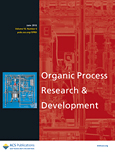
ORGANIC PROCESS RESEARCH & DEVELOPMENT
Elevating Organic Chemistry: Where Research Meets Real-World ImpactORGANIC PROCESS RESEARCH & DEVELOPMENT, published by the American Chemical Society, is a premier journal dedicated to advancing the field of organic chemistry and its applications in process research and development. Since its inception in 1997, the journal has established itself as a leading source of innovative research, receiving a prestigious Q1 ranking in both Organic Chemistry and Physical and Theoretical Chemistry as of 2023. This esteemed publication, accessible in print and online formats, caters to a wide range of topics including synthetic methodologies, reaction engineering, and the integration of green chemistry principles. With a commitment to excellence, it aims to disseminate high-quality research that not only contributes to academic knowledge but also addresses real-world challenges in the chemical industry. The journal's significant impact is reflected in its Scopus ranking, where it holds an impressive position in the 75th percentile among its peers. Researchers, professionals, and students in the field are encouraged to explore and contribute to this influential platform, which plays a vital role in shaping the future of organic process development.
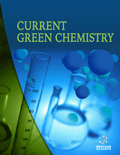
Current Green Chemistry
Transforming chemical research for a sustainable tomorrow.Current Green Chemistry, published by Bentham Science Publishers, is a pivotal scholarly resource devoted to advancing the field of green chemistry. With ISSN 2213-3461 and E-ISSN 2213-347X, this journal serves as a crucial platform for researchers and professionals to explore innovative and sustainable practices within the chemical sciences. The journal has demonstrated significant recognition, evidenced by its categorization in the third quartile (Q3) across various specializations including Analytical Chemistry and Inorganic Chemistry, and even a fourth quartile (Q4) in Organic Chemistry, according to the latest Scopus metrics. This indicates a growing influence in relevant fields, making it a valuable reference for contemporary environmental initiatives. The journal's accessible nature, although not open access, ensures researchers can still engage with high-quality, peer-reviewed content. Spanning an impressive converged period from 2019 to 2024, Current Green Chemistry is committed to enhancing the visibility of groundbreaking research that aligns with sustainable development objectives, making it an essential resource for anyone interested in the future of chemistry.
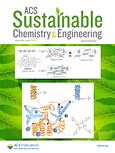
ACS Sustainable Chemistry & Engineering
Driving innovation for a sustainable world.ACS Sustainable Chemistry & Engineering is a premier journal published by the American Chemical Society, dedicated to advancing knowledge and innovation in the fields of sustainable chemistry and engineering. With an impressive impact factor and a consistent ranking in the Q1 category across various disciplines such as Chemical Engineering, Chemistry, Environmental Chemistry, and Renewable Energy, this journal serves as a vital resource for researchers, professionals, and students alike. Since its inception in 2013, the journal has been committed to publishing high-quality, peer-reviewed articles that address the critical challenges of sustainability in chemistry and engineering. With no open-access option currently available, the journal emphasizes the importance of premium scholarly communication. As the field continues to evolve, ACS Sustainable Chemistry & Engineering remains at the forefront of providing cutting-edge research that impacts our understanding and application of sustainable practices in the chemical sciences.

Korean Chemical Engineering Research
Advancing Sustainable Practices in Chemical ProcessesKorean Chemical Engineering Research, published by the Korean Institute of Chemical Engineers, serves as a vital resource for those engaged in the expansive field of chemical engineering. With an ISSN of 0304-128X and an E-ISSN of 2233-9558, the journal offers a platform for scholarly articles that cover various aspects of chemical processes, innovative technologies, and sustainability practices in engineering. Despite being in the Q4 category of chemical engineering journals as per the 2023 rankings, the journal's focus on emerging research from South Korea and beyond presents unique insights valuable to professionals, researchers, and students alike. Operating under effective citation metrics, it finds its place within Scopus, ranking at 229 out of 273, indicating a niche yet specialized contribution to the broader scientific community. We invite you to explore this integral journal, which is committed to fostering discourse and development in chemical engineering through its extensive archive, dating back to 2014 and continuing to evolve through 2023.

Chemical Product and Process Modeling
Empowering researchers with vital insights in chemical product development.Chemical Product and Process Modeling is a vital academic journal published by WALTER DE GRUYTER GMBH, focusing on the intricate intersection of chemical engineering and mathematical modeling. Since its inception in 2006, this journal has been instrumental in disseminating significant research findings and methodologies that advance the modeling and simulation of chemical products and processes. With an ISSN of 1934-2659, it caters to a global audience from its base in Berlin, Germany. Although positioned within the Q3 and Q4 quartiles in Chemical Engineering and Modeling & Simulation categories respectively in 2023, it offers a platform for innovative approaches and contributions in these fields, making it a resource for researchers and industry experts alike. Access to the journal's content is offered through subscription models, enabling professionals and academics to stay abreast of the latest developments. In a rapidly evolving scientific landscape, Chemical Product and Process Modeling remains dedicated to enhancing knowledge and fostering collaboration within the chemical engineering community.

Journal of Industrial and Engineering Chemistry
Driving Excellence in Chemical Engineering ResearchThe Journal of Industrial and Engineering Chemistry, published by Elsevier Science Inc, stands as a premier platform since its inception in 1996, dedicated to the dissemination of innovative research in the field of Chemical Engineering. Located in South Korea, this influential journal has established itself with an impressive impact factor and is categorized in the Q1 quartile for chemical engineering (miscellaneous), ranking in the top 12% of its category according to Scopus. With a focus on cutting-edge industrial applications, the journal covers a diverse range of topics including chemical processes, engineering innovations, and sustainable practices, appealing to a broad spectrum of researchers, professionals, and students. Although currently not open access, the journal offers a wealth of resources for advancing knowledge and driving forward the chemical engineering discipline. The converged years from 1996 to 2024 reflect its ongoing commitment to excellence and timeliness in publishing high-quality research.
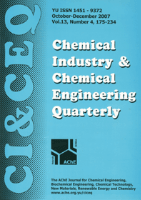
Chemical Industry & Chemical Engineering Quarterly
Unlocking Potential in Chemical Processes and Engineering.Chemical Industry & Chemical Engineering Quarterly is a distinguished, open-access journal published by ASSOC CHEMICAL ENG that serves as a vital platform for innovative research within the field of chemical engineering. Established in 2000 and actively disseminating knowledge since then, this journal has garnered acknowledgment for its contribution to the field, currently being ranked in the third quartile (Q3) of Chemical Engineering (Miscellaneous) for 2023. With a focus on advancing understanding of chemical processes and facilitating the integration of industry operations with engineering principles, it provides a forum for both theoretical and applied research. The journal is committed to maintaining high standards of academic rigor, supported by its indexed presence in Scopus, where it ranks #173 out of 273 in the general chemical engineering category. As an open-access journal, it promotes the rapid dissemination of research findings, enhancing accessibility for scholars, professionals, and students worldwide. Based in Serbia, the journal is an essential resource for those seeking to stay at the forefront of chemical engineering advancements.
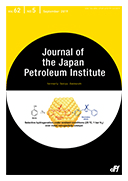
JOURNAL OF THE JAPAN PETROLEUM INSTITUTE
Driving Sustainable Energy Solutions Through Collaborative ResearchJOURNAL OF THE JAPAN PETROLEUM INSTITUTE, published by the Japan Petroleum Institute, is a leading scholarly journal dedicated to advancing research and innovation in the fields of Energy Engineering, Fuel Technology, and related disciplines. With an ISSN of 1346-8804 and an E-ISSN of 1349-273X, the journal has established a significant presence within the academic community, recognized for its impact and rigor, as evidenced by its Q3 quartile rankings in both Energy Engineering and Power Technology and Fuel Technology as of 2023. The journal, which converges research from 2002 to 2024, provides a vital platform for researchers, professionals, and students to share their findings and insights into petroleum-related challenges and advancements. While specific metrics such as HIndex are not stated, the journal's inclusion in leading academic databases reflects its commitment to quality and accessibility in research dissemination. Readers can view the journal's open access options to engage with cutting-edge studies that contribute to the sustainable advancements in energy resources and technology. Situated in Tokyo, Japan, this journal continues to play an essential role in fostering dialogue and discovery within the petroleum research community.
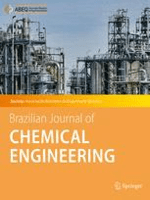
BRAZILIAN JOURNAL OF CHEMICAL ENGINEERING
Shaping the Future of Chemical Engineering, TogetherThe Brazilian Journal of Chemical Engineering (ISSN: 0104-6632, E-ISSN: 1678-4383), published by Springer Heidelberg, stands as a prominent open-access journal dedicated to disseminating innovative research and advancements in chemical engineering since its inception in 1997. With a commitment to enhancing knowledge exchange within the field, this journal is indexed in Scopus, earning a respectable Q3 rank in the category of General Chemical Engineering as of 2023. It provides a platform for researchers, professionals, and students to explore a diverse range of topics, fostering collaboration and innovation from its base in Brazil. The journal has converged its operations from 1995 and will continue to push the boundaries of chemical engineering research until 2024 and beyond. As a critical resource for up-to-date methodologies and emerging trends, the Brazilian Journal of Chemical Engineering is essential for those aiming to make impactful contributions in this dynamic and evolving field.
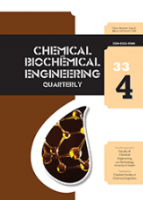
CHEMICAL AND BIOCHEMICAL ENGINEERING QUARTERLY
Fostering Collaboration in Chemical Engineering ExcellenceCHEMICAL AND BIOCHEMICAL ENGINEERING QUARTERLY, published by the Croatian Society of Chemical Engineering Technology, is a distinguished open-access journal that has been providing a platform for the dissemination of innovative research since its inception in 1987. With a focus on the fields of biochemistry and chemical engineering, this quarterly journal addresses a wide array of topics, including process chemistry and technology, making significant contributions to both academia and industry. Despite its current positioning in the Q4 category for biochemistry and Q3 for miscellaneous chemistry and process chemistry in 2023, the journal continues to strive for greater impact, catering to researchers, professionals, and students alike. Its open-access model, in place since 2001, ensures that cutting-edge research is accessible to a broad audience, fostering collaboration and knowledge sharing within the scientific community. By promoting high-quality research and providing insights into the latest advancements, Chemical and Biochemical Engineering Quarterly remains an essential resource for those involved in the chemical and biochemical engineering disciplines.